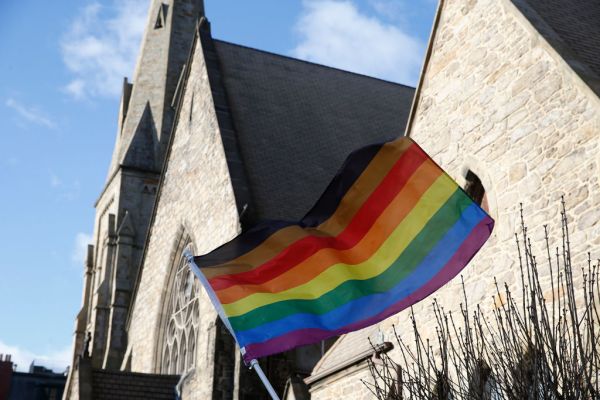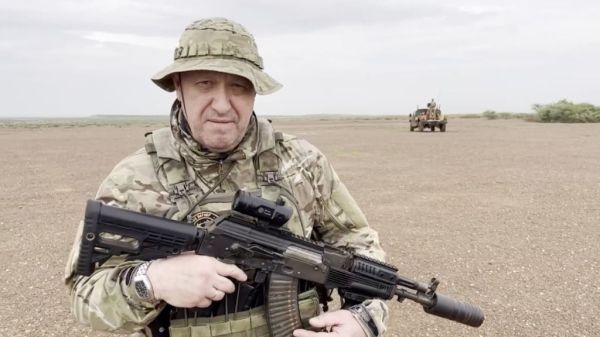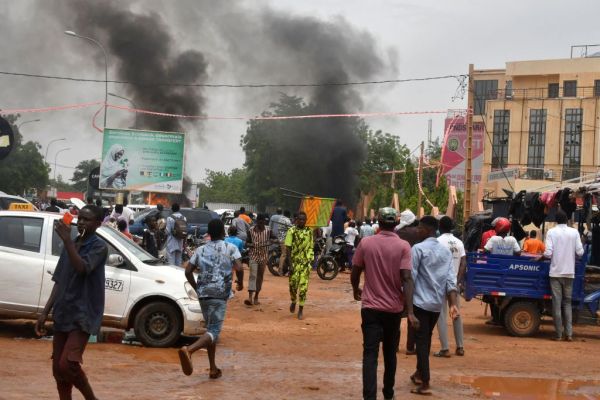Happy Wednesday! If you’re a fan of the American experiment but aren’t totally on board with the imperial system of measurement, boy do we have a comedy sketch for you.
Quick Hits: Today’s Top Stories
- The Israeli Defense Forces (IDF) announced on Tuesday that they carried out an airstrike on Jabaliya, a town and refugee camp in northern Gaza, reportedly killing Ibrahim Biari—commander of Hamas’ Central Jabaliya Battalion, who the IDF says was one of the terrorist leaders responsible for planning the October 7 attacks that killed some 1,400 Israelis. The IDF said air and ground operations also killed several other Hamas terrorists and destroyed parts of the group’s tunnel system. Images from Jabaliya showed several large craters in the ground ringed by collapsing buildings, and while at time of writing it was unclear how many civilians were wounded or killed in the strike, early eyewitness reports suggested it could be dozens. “It’s the tragedy of war,” IDF spokesman Lt. Col. Richard Hecht told CNN’s Wolf Blitzer when asked about the potential civilian casualties of the operations. “We’ve been saying for days, move south.”
- At least eight prominent opposition members in the Indian parliament, as well as several journalists, reported receiving a notification from Apple earlier this week of possible “state-sponsored attackers” targeting their iPhones, though Apple did not specify which state may have been behind the attempted hack. Several of the MPs who received notifications are part of a newly-formed bloc of opposition parties, which aims to present a united challenge to Prime Minister Narendra Modi’s ruling Bharatiya Janata party (BJP) in next year’s election, and accused the BJP of spying—an allegation the BJP denied.
- French police shot and wounded an unarmed woman at a Paris commuter rail station Tuesday who was wearing a hijab and reportedly shouting “Allahu Akbar” and “you are all going to die” at commuters. Officers shot the woman—who police believe may have also threatened security forces protecting French sites from terrorism in 2021—when she refused to comply with police orders. The incident, which is currently under investigation, occurred while France was already at its highest alert level for terrorism following the fatal stabbing of a teacher in a suspected terrorist attack in northern France last month and several threats made against French airports and cultural sites amid war in the Middle East. Meanwhile, FBI Director Christopher Wray, in testimony before the Senate Homeland Security and Governmental Affairs Committee Tuesday, said the October 7 Hamas attack on Israel has raised the threat of international terrorism in the U.S.
- A student at Cornell University was arrested Tuesday in connection with antisemitic threats made against the school’s Jewish community on an online discussion board. Patrick Dai, a 21-year-old junior at the school, faces a federal charge of posting threats to kill or injure another using interstate communications for which the maximum sentence is five years in prison and a $250,000 fine after threatening over the weekend to “shoot up” campus buildings and to attack Jewish students.
- The Senate voted 53-43 on Tuesday—largely along party lines— to confirm former Treasury Secretary Jack Lew as the U.S. ambassador to Israel. Many Republicans opposed Lew’s nomination over his support for the 2015 Iran nuclear deal. The Defense Department said U.S. special operations forces were on the ground in Israel helping the IDF locate the more than 200 hostages Hamas took on October 7, though Assistant Secretary of Defense Christopher P. Maier declined to say how many U.S. troops were deployed to the embattled country.
- A federal judge on Monday temporarily barred federal officers from cutting concertina wire along the Texas-Mexico border, with exceptions for instances where cutting the wire would prevent life-threatening injuries. “The Court shall grant the temporary relief requested, with one important exception for any medical emergency that most likely results in serious bodily injury or death to a person, absent any boats or other life-saving apparatus available to avoid such medical emergencies prior to reaching the concertina wire barrier,” wrote Judge Alia Moses, a George W. Bush appointee. The restraining order—which expires November 13—comes in response to a lawsuit filed by Texas Attorney General Ken Paxton last week.
- White House press secretary Karine Jean-Pierre confirmed Tuesday that President Joe Biden will meet with Chinese President Xi Jinping later this month in San Francisco, California, on the sidelines of the Asia-Pacific Economic Cooperation summit. The last time the two leaders met was in November 2022, at the G20 leaders summit in Bali, Indonesia.
- More than 4,000 residents of Southern California were ordered to evacuate this week after a wildfire fueled by Santa Ana winds broke out around midday. The fire grew exponentially on Monday afternoon, exploding from its original 14 affected acres to more than 1,200 acres—almost two square miles—seven hours later. By Tuesday afternoon, the fire was raging over more than 2,000 acres, stoked by 50 mile-per-hour wind gusts.
- Rep. Earl Blumenauer, a Democrat from Oregon, announced Tuesday he will not seek another term in Congress after nearly three decades serving in the House of Representatives. He was first elected in 1996 after having served in other state and local offices in Oregon.
In the Midst of Catastrophe

In 2003, a 10-year-old boy was forced to flee ethnic violence and genocide in the Darfur region of Sudan, crossing the border into neighboring Chad. He returned years later to start a life again in his homeland, but this past April, now a grown man with a family, he had to flee to Chad once more as violence broke out yet again, sustaining a gunshot wound to the leg during his escape. “When I see the freedom, I can go back,” he told The Economist. “But there is no freedom now. I cannot go back.”
His is one of hundreds of gut-wrenching stories coming out of war-torn Sudan as warring military and paramilitary factions continue to wage a bloody civil conflict, killing thousands and displacing millions. The United States and regional partners announced renewed ceasefire talks last week, but little progress towards peace has been made since fighting erupted six months ago while reports of ethnic cleansing have grown.
The conflict involves two warring factions of Sudanese military forces led by rival generals who came to power in the aftermath of a popular uprising against long-time dictator Omar al-Bashir. As we wrote in April when the fighting broke out:
Army chief Gen. Abdel Fattah al-Burhan commands Sudan’s military. At the same time, Mohamed Hamdan “Hemedti” Dagalo runs the Rapid Support Forces (RSF). This paramilitary group sprung from the Janjaweed militias that participated in genocide in Darfur and which was later elevated by Bashir in part as coup insurance to counter the power of Sudan’s military. Burhan and Hemedti joined forces to help oust Bashir following widespread protests in 2019 and participated in discussions with a civilian transitional government—before executing a coup in 2021 and cracking down on protests. Both assented to a United Nations-backed framework for restoring civilian rule in December 2022, but they clashed over combining forces.
Tensions boiled over in April, with heavy fighting concentrated in the country’s capital of Khartoum. The fighting is ongoing six months later, with much of Khartoum destroyed as the two groups continue to battle in the capital (although RSF has gained ground) and the nearby city of Omdurman. Burhan’s Sudanese Armed Forces (SAF) control Port Sudan in the east of the country, while the RSF controls much of Western Darfur, including its capital city El Geneina. Hemedti’s forces took over the South Darfur capital city of Nyala last week, and fighting continues around SAF bases in North and East Darfur.
According to the United Nations, the war has killed 9,000 people and displaced 5.6 million others. Most in that latter group have fled to other areas within Sudan, but more than 1 million have taken refuge in neighboring countries like Egypt and Chad. The refugees include thousands of Masalit people—a black African ethnic and tribal group that predominates in West Darfur—who face ethnic violence at the hands of the RSF.
The RSF took control of most of Geneina in April as the SAF retreated to their base in the city, and began killing Masalit people trapped therein. The fighting, combined with a telecommunications blackout, initially made it difficult for outside observers to see what was happening—but a gruesome picture has since emerged.
In September, Reuters produced the first comprehensive report of the human toll in Geneina, which included interviews with more than 1oo people who fled the city as well as supporting satellite images, photos, and footage posted online. Reuters journalists Maggie Michael and Ryan McNeil described the summer in the city as “a rolling ethnic killing campaign that lasted for weeks.” Survivors of the attacks described the slaughter as “the end of days.” The RSF and their allied militias often went house to house in search of Masalit men and boys to kill. Mothers dressed their sons as girls and in some cases, hid them under beds or even pushed them out windows to escape the militias. The militants executed people in their homes and then positioned snipers to kill family members trying to retrieve the bodies for burial. They reportedly raped dozens of women.
The United Nations Joint Human Rights Offices has received credible reports of more than a dozen mass graves around Geneina, as the RSF attempted to hide the evidence of the brutal killings carried out against the Masalit community. The slaughter was at its worst in mid-June, and on June 14, Khamis Abakar, the governor of West Darfur, publicly decried the RSF atrocities as genocidal and called for international intervention. “People are targeted … on a daily basis, based on their ethnicity,” he said. Hours later, he was arrested by RSF forces and killed. Abakar’s death spurred hundreds of Masalit families to try to flee the city, either to the SAF base or across the border to Chad. Between June 15 and 17, RSF forces hunted people down as they fled. “More than 1,000 people were killed on June 15,” a local humanitarian worker told CNN. “I was collecting bodies on that day. I collected a huge number.”
The atrocities aren’t confined to Geneina. Villages throughout West Darfur have experienced violence—at least 68 have been burned, and some have been entirely destroyed. International rights authorities have described the violence against the Masalit in Darfur as a clear case of ethnic cleansing. “This has all the hallmarks of ethnic cleansing,” Andrew Mitchell, the United Kingdom Minister for Africa, said last month. “It’s going on just as it was back from 2003 onwards. It’s going on in the same way today, if anything with even more ferocity.” Karim Khan, Prosecutor of the International Criminal Court, told the UN Security Council in July, “We now are in peril of allowing history to repeat itself, yet again, before our eyes.”
“We are not on the precipice of a human rights catastrophe,” he added. “We are in the midst of one.”
Though the RSF has waged the campaign of ethnic cleansing, the SAF’s record is far from clean. “There is little doubt who is responsible for what: often indiscriminate aerial bombing is conducted by those who have an air force, which is the SAF,” Volker Perthes, U.N. special envoy to Sudan, said in his resignation speech in September. “Most of the sexual violence, lootings, and killings happen in areas controlled by the RSF. Both sides are arbitrarily arresting, detaining, and even torturing civilians, and there are reports of extrajudicial killings and detentions.” (Burhan declared Perthes persona non grata this summer, likely causing his resignation.)
For people not caught directly in the killing or military slaughter, the humanitarian situation is also bleak. A cholera outbreak is spreading through Sudan. One-third of the population—approximately 15 million people—is food insecure with millions more projected to be at risk of hunger in the coming months, according to the World Food Program.
Ceasefire talks brokered by the U.S. and Saudi Arabia, in partnership with the African Union and the Intergovernmental Authority on Development (IGAD)—a trade bloc of eight countries in the Horn of Africa region—reopened ceasefire talks hosted in Jeddah, Saudi Arabia, last week. “The reconvened talks continue to have a narrow set of objectives—to facilitate the delivery of humanitarian assistance, establish ceasefires and other confidence-building measures, and build toward a permanent cessation of hostilities,” the State Department said in a statement on Sunday. But analysts aren’t holding their breath for any breakthroughs. There have been at least nine ceasefire deals that have failed since April. The longer the conflict continues, the greater the chances the country will settle into a protracted civil war, resulting in more death and suffering for millions of Sudanese.
For now, Burhan and Hemedti seem content to continue fighting. The SAF said in a statement last week, “The resumption of negotiations does not mean a halt of the national battle.”
Worth Your Time
- After more than 300,000 Israeli reservists were called up to fight Hamas, Israel’s teenagers are stepping up to fill needs in their communities. “It’s all part of a swift and notable shift in a country that refers to school-aged teens as being ‘stupid-age,’” Daniela Gribetz wrote for The Times of Israel. “In ordinary circumstances, Israeli teens are not assigned many responsibilities before they graduate from high school, in a nod to the fact that most will enter compulsory military service soon after turning 18, cutting short the extended adolescence that many of their peers in other countries enjoy. Odelia Kaye, 16, from Jerusalem, has been offering practical and emotional support for mothers who are now caring for young children on their own. ‘Sometimes they’re alone and it’s really difficult to take care of kids by yourself,’ she said. In addition to playing with children, washing dishes, cleaning up and folding laundry for mothers on their own, Kaye has found that what is sometimes most appreciated is the company. ‘I feel like the more I’ve done it, the more I’ve learned about how difficult it is for some of these moms who have really small children, including young babies, a couple of months old,’ said Kaye. ‘These moms need emotional support. It’s easy to feel alone and it’s important for me to make sure that these people know that they’re not alone and that I’m there to help.’”
- Richard Gingras, global vice president of news at Google, has some thoughts on how the internet and digital media have contributed to political polarization around the world. “We have no innate sense of reasoning. We are first and foremost tribal beings,” he wrote in a recent Medium post. “We think first through the filter of what our friends, our tribes, expect us to believe. We think first, as Daniel Goleman has made clear, through a social construct. If the head of the tribe says the moon is green, one would be inclined to agree, lest one not receive a leg of the roasting calf. This is not a new trend. It is not representative of any particular ideology. It is who we are. With the Internet, the mathematics of the media space, the information space, changed. As a society’s access and participation in media became more open, the information space became intrinsically more diverse, and mathematically more divisive. The Internet broke the information space into a million shards, from 500 channels to more than a billion websites. We can choose, and do choose, the voices that reflect our view of our world, the voices that reflect and confirm our biases—good, bad, and indifferent. This challenges our core understanding of free expression, of the recognition that supporting free expression means accepting the existence of expression we find uncomfortable, indeed heinous.”
Presented Without Comment
Wall Street Journal: Protesters Interrupt Blinken Testimony With Shouts of “Ceasefire Now”
Toeing the Company Line
- What’s it like fact checking the Israel-Hamas war? What questions would Dispatchers ask Donald Trump? Is The Exorcist still a good horror film? Kevin was joined by Steve, Drucker, Alex, and Mary to discuss all that and more on last night’s Dispatch Live (🔒). Members who missed the conversation can catch a rerun—either video or audio-only—by clicking here.
- Alex corrects the record on an inaccurate map of purported U.S. military base locations in the Middle East.
- In the newsletters: Haley provided an update on House Republicans’ efforts to divorce Israel aid from money for Ukraine, and Nick highlighted (🔒) the contradictions in Speaker Mike Johnson’s efforts to pay for Israel aid with IRS cuts.
- On the podcasts: Jonah is joined on The Remnant by Greg Lukianoff to discuss his new book on cancel culture.
- On the site today: Mike checks in with Tim Scott’s Senate colleagues on the South Carolinian’s presidential bid and Jonah writes on the virtue of good editing as he tries to make sense of the media’s blunders on the Israel-Hamas war.
Let Us Know
What do you think explains the disparities between media coverage of the violence in Sudan and violence elsewhere around the world?










Please note that we at The Dispatch hold ourselves, our work, and our commenters to a higher standard than other places on the internet. We welcome comments that foster genuine debate or discussion—including comments critical of us or our work—but responses that include ad hominem attacks on fellow Dispatch members or are intended to stoke fear and anger may be moderated.
You are currently using a limited time guest pass and do not have access to commenting. Consider subscribing to join the conversation.
With your membership, you only have the ability to comment on The Morning Dispatch articles. Consider upgrading to join the conversation everywhere.